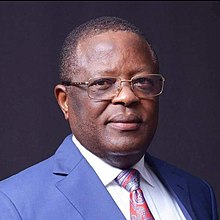By Haruna Salami
Irked by the decision of President Muhammadu Buhari to veto the Electoral Act (Amendment Bill) some aggrieved senators have started collecting signatures to overide his veto.
According to Senator George Sekibo (River East), about 73 signatures of aggrieved lawmakers have been collated adding that there is no going back on the decision to overide Buhari.
Prior to his brief interview with press men after the plenary Senator Sekibo had earlier forced the upper chamber to go into a closed session after citing Order 14 of the Senate Rules which deals with members’ privileges.
Senator Sekibo used the opportunity of the closed session to vent his anger on the decision of President Muhammadu Buhari to turn down the signing of the Electoral Bill after it was duely passed by the two chambers of the National Assembly.
After the closed session that lasted for about 40 minutes, the could not continue with all other items listed in the other paper for the day including the much celebrated passage of the 2022 Appropriations bill .
Senate Refuses to Pass 2022 Budget
Newsdiaryonline had reported earlier that the Senate Tuesday refused to pass the 2022 Appropriation Bill (budget) over the president’s withholding of assent to Electoral Act Amendment Bill over the inclusion of direct primary election.
The chairman of Appropriation Committee, Barau Jibrin had told journalists Monday that the budget would be passed Tuesday (today) and it scheduled on the Order Paper for Tuesday.
The Finance Bill amendment, which is a forerunner to passing the budget was adequately captured in the business of the day.
However, the senators, apparently not happy over the president’s action had a change of mind over the passage of the budget.
Signs of trouble were visible early Tuesday when the Senate, after the opening prayer to commence the business of the day went into “close session) where thorny issues are usually trashed.
On resumption, the letter was read, triggering outrageous reactions across party divide, but the leadership was able to manage to confirm, Mu’azu Jaji Sambo as minister.
The Senate then suspended its standing rules to enable them stay beyond 2 pm, all in an attempt to pass the 2022 budget.
The upper chamber was able to deal with the Finance Bill 2021, but shortly went into another closed door session, an indication that trouble was still in the air.
Suddenly, on return from the close door, the Senate President simply announced that the Senate has adjourned till Wednesday contrary to the original plan to pass the budget and proceed on vacation same day.
As the senators left the chamber, one could see anger on their faces.
In an interview, Senator Abbah Moro, visibly angry said an electoral process that gives room to a wider spread of the members of a political party to choose their leaders is certainly a better option than handing over the gate and destiny of Nigerians to a few cabal that want to control the Commonwealth of this country, I think it is unacceptable”.
“That is why this Senate had the courage to say no, this time around.
Moro said it was not the first time the president would use “any flimsy” excuse to withhold assent to electoral bill amendment.
“You will recall that in 2019 the president rejected electoral amendment for the simple reason that electronic elections and transmission of election results were included.
“Here we are, the reason he is giving, to my mind and to the majority of senators, is not enough because all stakeholders have acknowledged the fact that the amended Electoral Act as it is today contains fantastic provisions that can deepen democracy.
So, if we reject the amended Electoral Act because of direct primary, the it is very unfortunate.
“Whether you like it or not, in our electoral system, given the background of the average Nigerian, especially the politicians, there is no way you can prevent a politician from inducing or so to say corrupt the electorate. It is embedded in our style that you must go to the people either via stomach infrastructure or by monetary inducement.
According to him, the cost implication that being used as excuse now is neither here nor there because relevant stakeholders in the electoral process, especially the INEC has said that there is no additional cost implications.
“As a member of Appropriations Committee, when INEC chairman was invited, he frankly told us that even in the present Electoral Act that provides for direct and indirect primary, that they are prepared for any type of election. This means they are prepared for direct and indirect primary because, assuming a party chooses direct primary now, they are not going to ask for additional funds”.
By his experience, he said, it is the candidates that bear the cost of primary elections. The party and INEC only send people to monitor and observe, adding “in all the 774 local governments in this country, INEC has personnel there in their numbers”.




